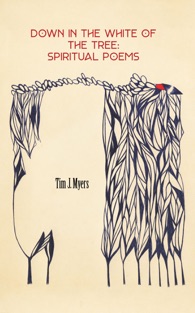All text and images copyright Tim Myers 2008

Down in the White of the Tree:
Spiritual Poems
by Tim J. Myers
Regal House Publishing 2018
“I take the nameless whale now
as one of my saints. I have questions for him.
They rise in me like something
deep currents keep bringing back to sunlit shores.”
--from "Capitola Beach, New Year’s Day ‘03"
“Tim J. Myers writes of the sacred—not inside church halls looking through stained-glass windows—but with the cat in the alleyway, the bat sweeping through night, white trees, winter’s slushy streets. He puts “spirit’ where it needs to be, part of our daily lives, released from brick’s moral tones into an appreciation of all that’s alive among us. Myers writes with the heart’s imagination, placing light on our modest existences made more meaningful with a language that unifies mind and soul. Down in the White of the Tree is a contribution to spiritual literature because words are seeds, vectors of love and hope, and will change to the good with each reading.”
--Grace Cavalieri, poet, playwright, and director of “The Poet and the Poem from the Library of Congress”
"Tim J. Myers' poems transport you to places you did not know you longed to go. Spiritual masters often tell us that they experience happiness and sadness simultaneously, the mundane and the sacred together; these poems express that, capturing the mystical path. Once you are on it with Myers, you travel willingly into the unknown known he evokes. And you walk, as he puts it, 'in service to something deeper.' I invite you to travel with him in the beauty and refuge of his poems so you too can be transported and refreshed."
--Dr. Sarita Tamayo-Moraga, expert on Zen and Catholicism, Santa Clara University
Available November 16 2018
"Like the psalms, the poems in Down in the White of the Tree are hymns of praise, heart-felt memory, and amazement. This is a beautiful, masterful collection that our aching world truly needs."
--Ron Hansen, National Book Award finalist
"It's a challenge to say anything about this book that will not taste empty compared to the richness of the work itself. It is so full of miracle--the miracle of what is. A prayer can (should?) speak of death, a saint sees a crocus and a petty argument as one. This book feels like the aleph point in Borges' story of the same name, where things come together. There is such energy here."
--Dr. Glenn Appleby, mathematician and poet, Santa Clara University
